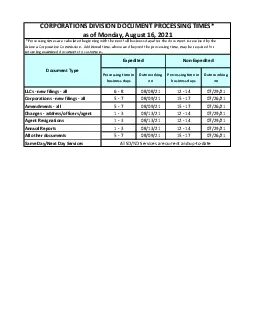PPT-Evolution of Information Processing
Author : berey | Published Date : 2024-03-13
Data Term Data may be defined as any collection of raw facts and figures For example Surveyors of newspaper companies visit door to door to collect data about the
Presentation Embed Code
Download Presentation
Download Presentation The PPT/PDF document "Evolution of Information Processing" is the property of its rightful owner. Permission is granted to download and print the materials on this website for personal, non-commercial use only, and to display it on your personal computer provided you do not modify the materials and that you retain all copyright notices contained in the materials. By downloading content from our website, you accept the terms of this agreement.
Evolution of Information Processing: Transcript
Download Rules Of Document
"Evolution of Information Processing"The content belongs to its owner. You may download and print it for personal use, without modification, and keep all copyright notices. By downloading, you agree to these terms.
Related Documents














